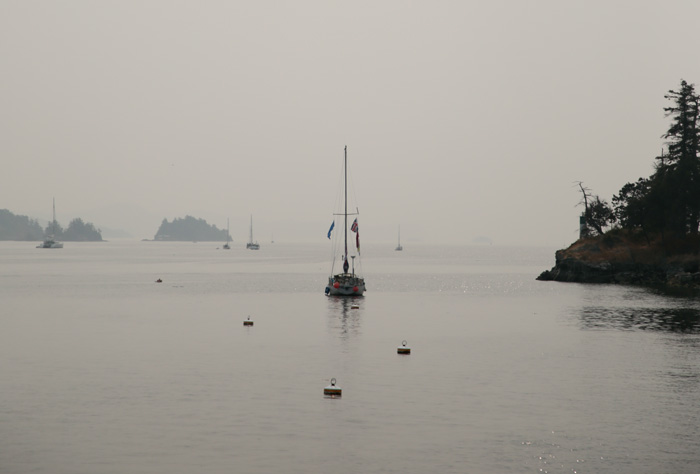Smoke from U.S. wildfires is impacting the south coast of B.C., including the Gulf Islands.
The B.C. Ministry of Environment has issued the following bulletin about the current situation, stressing that people with underlying health conditions need to be especially careful.
During a wildfire, smoke conditions can change quickly over short distances and can vary considerably hour by hour. Wildfire smoke is a natural part of our environment but it is important to be mindful that exposure to smoke may affect your health. People with pre-existing health conditions, respiratory infections such as COVID-19, older adults, pregnant women and infants, children, and sensitive individuals are more likely to experience health effects from smoke exposure.
Stop or reduce your activity level if breathing becomes uncomfortable or you feel unwell.
Stay cool and drink plenty of fluids.
If you have asthma or other chronic illness, carry any rescue (fast-acting) medications with you at all times and activate your personal care plan that has been designed with your family physician.
Make sure that children and others who cannot care for themselves follow the same advice.
Monitor your symptoms
People respond differently to smoke. Mild irritation and discomfort are common, and usually disappear when the smoke clears.
Exposure to wildfire smoke and the virus that causes COVID-19 can both result in respiratory symptoms such as a dry cough, sore throat, or difficulty breathing. Use the BC COVID-19 Self-Assessment Tool to help determine whether you need further assessment or testing for COVID-19.
If you are unsure whether you need medical care, call HealthLink BC at 8-1-1.
If you are experiencing difficulty in breathing, chest pain or discomfort, or a severe cough, contact your health care provider, walk-in clinic, or emergency department. If you are having a medical emergency, call 9-1-1.
Tips to reduce your smoke exposure
Smoke levels may be lower indoors but will still be elevated, so stay aware of your symptoms even when you are indoors.
Running a commercially available HEPA (high efficiency particulate air) filter can improve indoor air quality in the room where the device is located.
If you have a forced air heating/cooling system in your home, it may help to change the filter and set the fan to run continuously.
Reduce indoor air pollution sources such as smoking, burning incense, and frying foods.
If travelling in a car with air conditioning, keep the windows up and the ventilation set to recirculate.
If you are very sensitive to smoke, consider moving to another location with cleaner air, but be aware that conditions can change rapidly.
Maintaining good overall health is a good way to prevent health effects resulting from short-term exposure to air pollution.
More information
For additional general information about wildfire smoke and air quality:
Current Air Quality Health Index and air quality measurements: http://www. env.gov.bc.ca/epd/bcairquality/data/aqhi-table.html
Smoke forecasts (next 48 hours) Environment and Climate Change Canada FireWork prediction system:https: //weather.gc.ca/firework/index e.html
Blue Sky Canada Smoke Forecasting System: https://firesmoke.ca/forecasts/ current/

